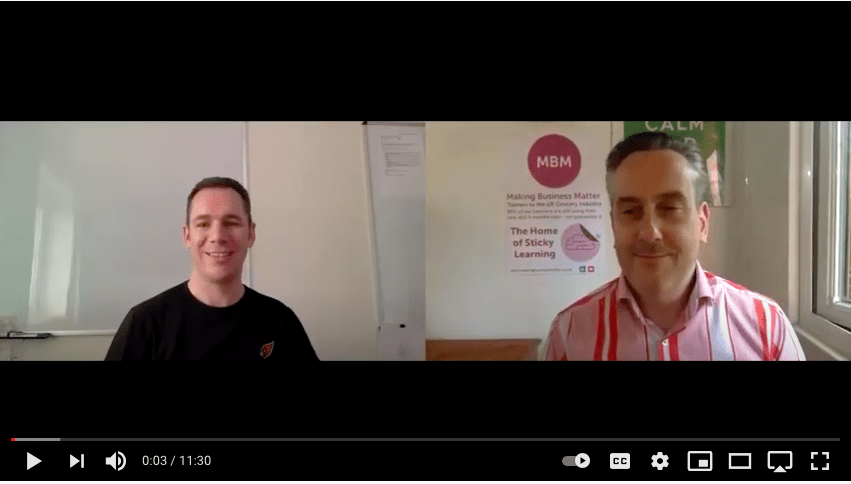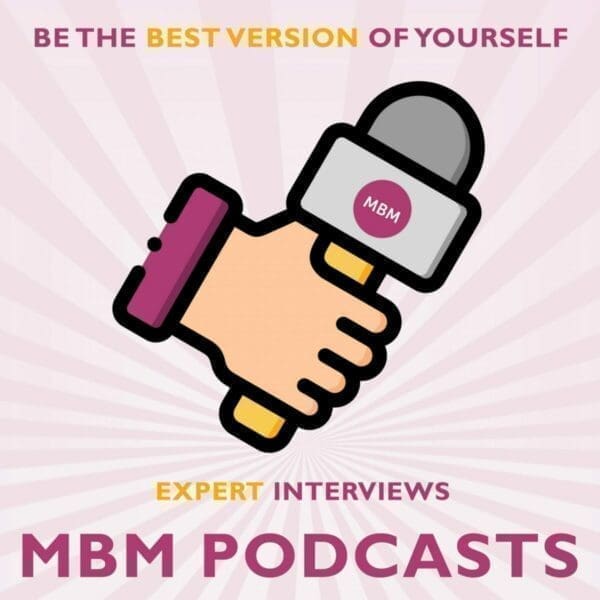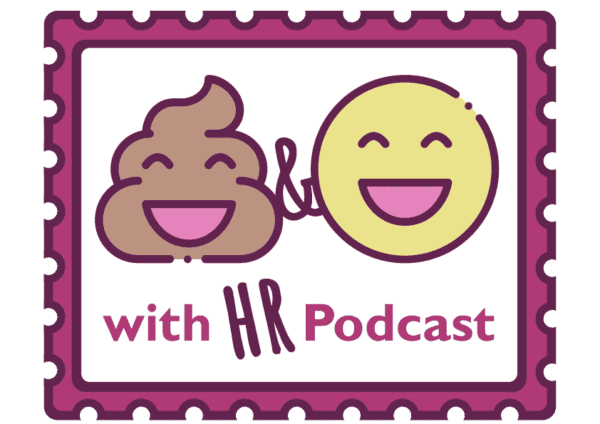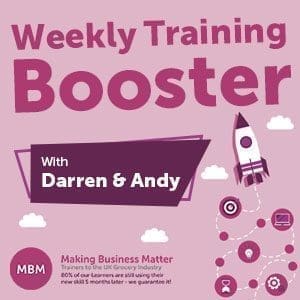Podcast: Play in new window | Download
Weekly Training Booster #2: Improve Your Time Management Skills
Join Andy Palmer and Darren A. Smith in the second episode of the Weekly Training Booster. This episode was about how to improve your time management skills with frogs, badgers, and woolly mammoths. Plus, the 7 hurdles of time management.
You Can Read the How to Improve Your Time Management Skills Episode Transcript Below:
Andy:
Good stuff. Okay. Welcome to this week’s MBM weekly training booster. Good afternoon, or good morning, depending on when you’re watching this video. I’m Andy from MBM here with my colleague Darren. Today, we’re talking about how to improve your time management skills. So for me, this is certainly the skill that unlocks all others. If we get this stuff right with a solid foundation to our core time management principles, everything else just magically falls into place. So let me throw that out there. Darren, how would you more better define time management?
Darren A. Smith:
Time management for me is the king of skills. It’s the key that unlocks the door. If you can get this one wrong, you can be a great influencer, a great negotiator, all those things, but if you haven’t got any time managed, then A, you don’t really know what you’re here trying to achieve ultimately, and B, you probably can’t do it because you’re all over the place. And you don’t look like a credible confident leader. You’re not really prepared for your negotiations. Your [inaudible 00:01:05] is done, but it’s natural, it’s not prepared, it’s not improved. So for me, it’s the key that unlocks all the doors. And it’s the one that a lot of people chase and never get right.
Andy:
Okay, cool. And if I was to throw it out there, just because I find it a little bit contentious. You can’t manage time, but you can manage the things that you do within that time. What’s your view on that kind of thinking?

Darren A. Smith:
Well, I love the phrase that goes time flies, but the good news is you’re pilot. Which is quite nice and that suits my right brain thinking. If I had my way I’d call it stuff management, not time management. Because you cannot manage time, you can only manage all the stuff. And when I say all the stuff, in our head, we don’t have work and home, we have things. So you have to manage both the home and the work stuff together. So when you’ve got a to-do list, it has a home and work on it. It’s not like, I’m at work, I’m at home. And particularly now that we’re all mostly working from home, although we might go back, it’s stuff, you’ve got to manage all the stuff.
Andy:
I think it makes good sense. I kind of liked the term stuff because actually it doesn’t matter if it’s big or it’s small, where that that can then take us then is how we then prioritize that stuff. And one of the best things I learned over the years was then how to prioritize the important stuff first, because I think we’ve seen it so often, people just tend to get the quick fun and easy done first. If we were to look about how you can improve your time management skills, not you personally, but how people can improve their time management skills, what for you would be that single simple, but yet powerful suggestion?
Darren A. Smith:
What I see, and particularly we’re pretty good on Google, is I see a lot of people searching for time management tips. They’re looking for the really small, easy win that makes the bigger difference. And here’s the bit that they’re going to hate me for, it doesn’t exist. Now for someone who used to be rubbish at time management that had to learn it over 15 years, I know it doesn’t exist because I’ve tried them all. So unfortunately this stuff is about mindset. And the one I’d like to share with people is eat that frog. So it came from a phrase of, if you do the biggest horriblest thing first, the frog, then the rest of the day is going to be easy. And as someone who does it, the euphoria of getting that big, horrible thing out of the way first, is amazing.
You should see people who think when everyone’s gone home or after six o’clock when I stop getting all these emails, all these phone calls, I’ll get the big thing done. So those big things, the bit that’s important in our job and takes most of our energy, but when we’re absolutely knackered after a 12 hour day, we’re trying to do the biggest thing.
Andy:
I like that. And conversely, from your right brain thinking to my left brain thinking, which is a far more logical and rational, in my world normal, joke, normal approach. I think what it does is it allows you to free up brain bandwidth. That it’s that space in your head to focus on the minutia. And yet all the other stuff that then comes throughout the day because you’ve got that big thing done. And why I don’t think there’s, and as you said, there’s not one silver bullet to improving your time management skills, getting that stuff done fist can be super powerful to then unlock your day and unlock your time.
Darren A. Smith:
It really does. If you can eat that frog, and it’s a mindset shift, and remember, it takes 21 times to develop the habit. Once you do it, it is amazing. You will see people, as you say, doing the quick fun and easy. “I’ll just get this done, this email. I’ll just talk to Bob. I’ll just go to this meeting. And then when I’ve got all that done, I’ll do the big stuff.” Actually, the big stuff then comes at six o’clock at night when you’ve just had enough.
Andy:
Yeah, that’s good. I think something you taught me a number of years ago and it’s always resonated with me was how to manage the time bandits. How to manage those people who come and steal your time. And I think for me, that’s both within people that do that, they rock up to your desk and give you a phone call. They’re trying to jump you on a call. They’re kind of managing their own agenda. But I also think it works from an email perspective. And maybe it’s that latter part that we are, I guess, shackled to our inboxes at times, can be for me one of the single biggest distractions to my day. What’s your thoughts because I know you’ve got them and I also think we’re going to probably connect to…
Darren A. Smith:
I’ve always got an opinion. They might like it, they might not. My metaphor for this, I call it the four minute badger. So the four minute badger is, imagine you’re driving and every four minutes a badger runs out in front of you. Now we all know how to drive and we do it really naturally without thinking, but a badger running out, I’ve got to stop, I’ve got to think, I’ve got to swerve, and then I can get back into driving. It’s the same with emails and notifications. So we on average receive 121 emails a day. That’s one every four minutes. And what we do is the email notification pops up and I just look there, click, have a look, have a read, not urgent, go back to what I’m doing.
But I’ve got to come out the task I’m doing, do that and go back in. Now imagine if that was a machine, every four minutes the machine went off and did something else for 10 seconds and came back. You’d take a sledgehammer to that machine. You’d call it inefficient. Yet that’s what we do, the four minute badger. So my top tip, turn off your email notifications. Queue hate mail because they’ll tell me why they can’t do it.
Andy:
That’s okay. You get the hate mail, the good news is you won’t see it until you choose to go into your inbox and see it. All right. I like that. Good. All right. So yeah, emails, time bandits, those people and things that steal our time. Conversely, where do you see other people doing that badly? Because I think we’re at risk of maybe being beholden to our inboxes and blaming everyone else, but yeah, I think we’re also quite guilty of that ourselves at times.
Darren A. Smith:
I think a mindset we’ve unfortunately got ourselves into of one of being “busy,” and it’s so easy to be busy. If I had a sign here where I’d put up the word busy equals job. If you’ve got a job, you’re busy. I don’t know anyone who’s got a job and sort of has Friday afternoon off or Monday morning and has a bit thing. They don’t. Life’s like that. So let’s just accept we’re going to be busy. Let’s accept that we’ve got more stuff to do than we have time. So now it’s about what’s really going to make the difference and how can we be most productive and most efficient? Part of that is getting out of our inbox and getting on with big stuff that we don’t want to do. Because if we’re busy, it’s a reason not to do the big horrible stuff, but it’s the big horrible stuff that makes the difference. It’s the big projects we’ve been putting off for years that we’ve got to get done.
Andy:
I’m mindful of kind of time and we could probably spend the next three or four hours, if not days talking about time management, and actually we do during our training courses. But actually, is there a way that people could take something even more practical away from today in terms of how they can improve their time management skills? Is there something that we can kind of challenge them with to say, “Here, go and embrace this and see where it takes you.”
Darren A. Smith:
Okay. So one other thing I’d ask them to do is create a daily to-do list. Now I can almost hear people’s eyes rolling. I’ve heard it before and I get it. Now what most people have is they either fall into the group of, I just have a bunch of things over here on post it notes they sort of look at and it’s all in a bit of a mess and I’ll get on with my inbox. Or they have a list, a stream of tasks that are all in a big pile. Or the really effective time managers have a daily to-do list. And I’m talking about an A4 sheet, I put, stuff I’m going to get done today. And each day they write a new list. Now my top tip is if you’ve a laptop, I won’t do it here, [inaudible 00:08:57], but I would put that list in my laptop, shut the lid. So when I start in the morning, I open the lid and say, “Oh, what’s this? I must write a daily to-do list.” That’s the trigger. It stops me getting on with my inbox.
Andy:
I like that. Get a to-do list, then it starts to get me thinking about the weekly objectives list, the monthly big stuff lists, those buckets that we’ve got with all that stuff coming in and how we can then manage that. I know we’ve got our seven week time management challenge. Do you want to give us 30, 60 seconds on that? And we’ll put the link in the bottom for those that are maybe a bit more curious of what that seven week time management challenge can actually look like.
Darren A. Smith:
Our model is seven hurdles for time management, one of them is capturing. The most successful people are the ones with the emptiest heads, which means we’ve got to get it out of our heads and into a system we can trust. I don’t care whether it’s paper, it’s notes, don’t care. We’ve going to get it out of our heads. And that’s one of the seven hurdles and that’s the seven hurdles of the time management challenge. And if we can crack all seven, we’re [inaudible 00:10:02].
Andy:
Yeah. Good stuff. All right. So we’ll put that link in the bottom. People can jump on that challenge. It’s a free exercise for you to do. Whole bunch of templates, more importantly, a whole bunch of thinking to help that mindset stuff that you’ve talked about. All right. That’s great. Darren, thank you. Any final thoughts or final words of wisdom for…
Darren A. Smith:
The brain likes Three. So I’ve talked about badgers, I’ve talked about frogs. Hopefully people are going, “Yeah, I sort of remember that.” I’m going to talk about wooly mammoths. On your to do list, never write a wooly mammoth, which is a great big task. I’ll give you an example at home. Don’t ever write move house, but do write, phone estate agent. Always make the big tasks something small because then the snowball will roll down the hill and before you know it, the estate agents calling me, solicitors calling me, we’re moving house. Love it.
Andy:
Excellent. Love that. All right. So we’ve got frogs, we’ve got mammoths, we’ve got badgers. That’s probably about as random as a recording as I think we’ve ever done it and I love it. Brilliant. All right. Good stuff. That was our weekly training booster, around about 10 minutes. Thank you for joining us today. This was about how to improve your time management skills. Next week, we’re going to pick another subject and actually if there’s one that’s particularly interesting to you, drop it in the comments and we’ll look to explore that. So thanks to Darren and thanks to everyone at home or at work who’s enjoyed this video.
Darren A. Smith:
Enjoy your badgers. Bye.
Take a look at the How to Improve Your Time Management Skills video on our YouTube Channel. Also, check out our award-winning blog.





